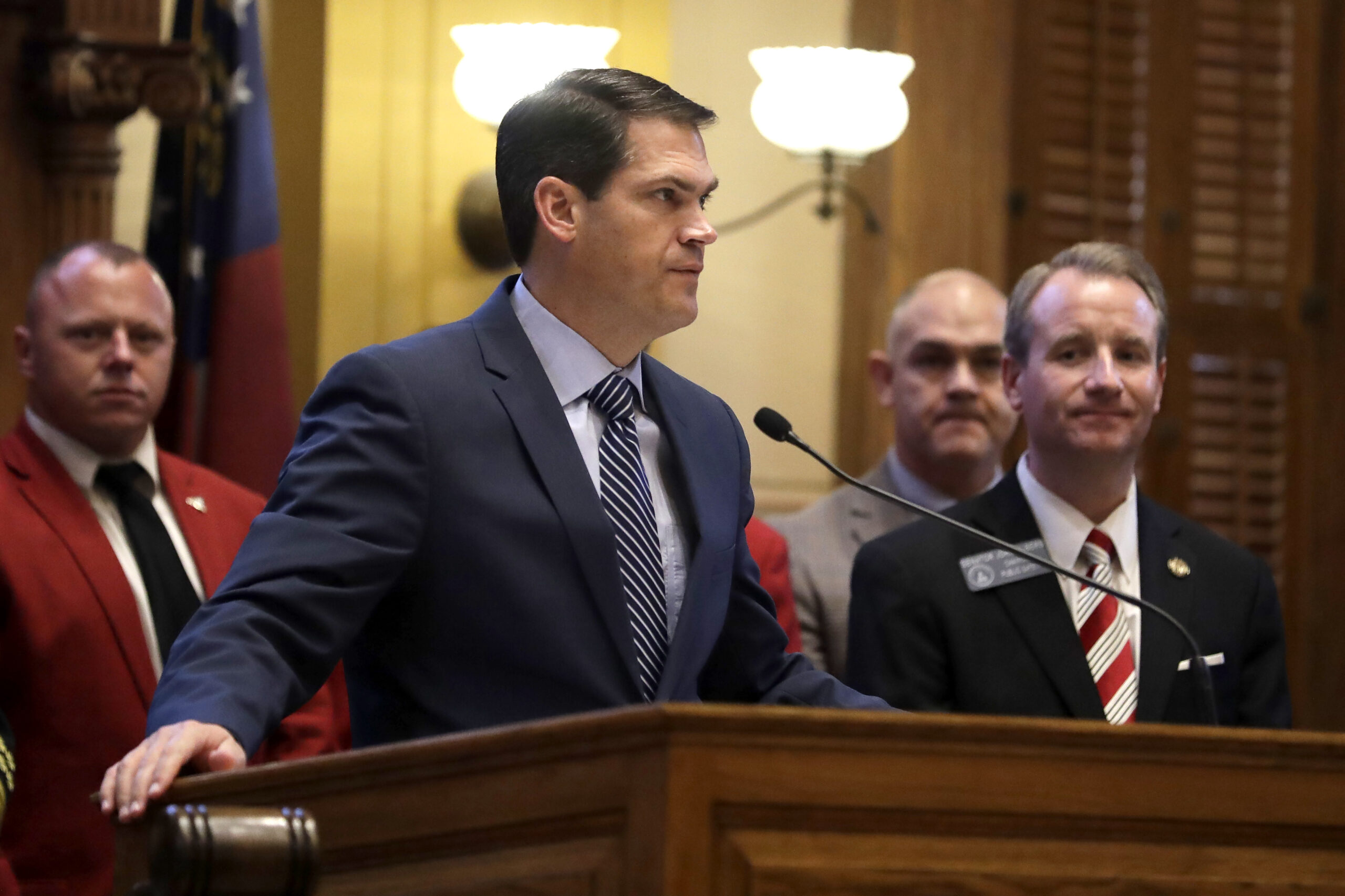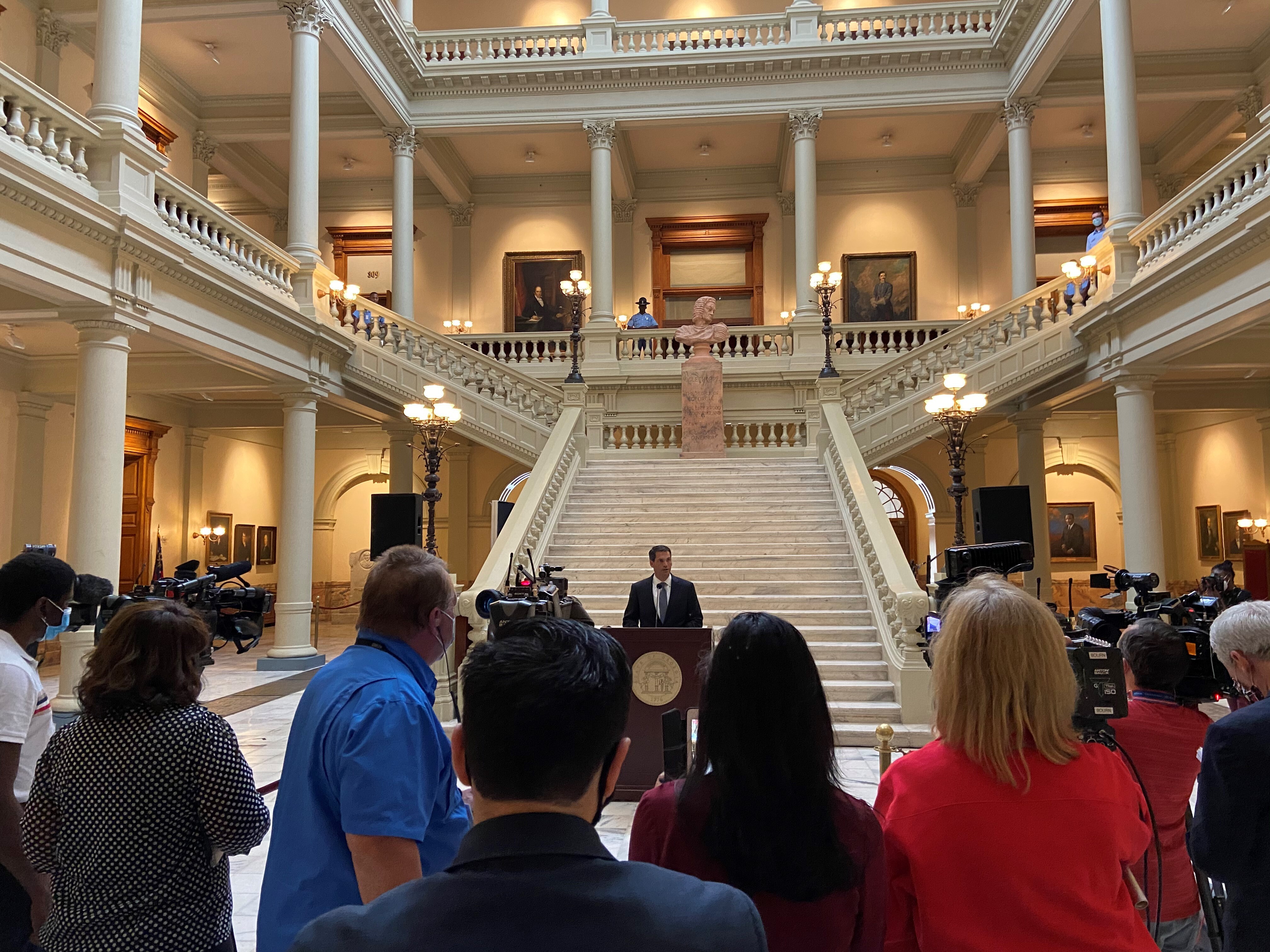Lt. Gov. Duncan Introduces New Hate Crimes Bill Amid Pressure Following Arbery Case

Lt. Gov. Geoff Duncan will not be running for U.S. Senate in 2022, and instead wants to focus on building the the Republican Party in Georgia.
John Bazemore / Associated Press
Updated at 3:47 p.m. Wednesday
Amid public pressure, Lt. Gov. Geoff Duncan has unveiled a new version of a hate crimes bill, but lawmakers on both sides of the aisle have pushed back on that version, questioning why an existing, stalled hate crimes bill, House Bill 426, has not advanced.
On Wednesday, Duncan called H.B. 426 “a simple sentencing enhancement” that “does not go far enough to deter and punish a hate crime.”
His version creates a separate charge for a hate crime to be prosecuted with and allows victims to petition for a grand jury hearing on a hate crime, should a prosecutor not prosecute that charge.
“There is no way to ignore the sense of urgency, the desire and the immediate need for the strongest hate crimes law in the country to show up on our books here in Georgia,” he said.
Duncan referenced the Ahmaud Arbery case as a reason for the urgency. The case has pushed the stalled bill back onto center stage for lawmakers, particularly because, according to recent court proceedings, a man in jail and facing charges in the shooting of Arbery, Travis McMichael, allegedly called Arbery a racial slur as he lay dying.
Duncan’s proposal increases the maximum punishment from two years in H.B. 426 to five years and creates a standardized reporting process for law enforcement of “bias-motivated crimes.”
H.B. 426 passed the Georgia House last March and has been stuck in the Senate Judiciary Committee since.

“I hope that the state Senate will give serious consideration to House Bill 426, which passed the Georgia House with bipartisan support. That language was carefully negotiated,” said state Rep. Chuck Efstration, a Republican who sponsored that bill.
“It would really send a strong message that Georgia is no place for hate.”
Efstration said he has “concerns” about the language of Duncan’s proposal but was awaiting further legal consultation to elaborate. He said he remains “hopeful” that H.B. 426 will move forward.
“This issue is way too important for 11 million Georgians, and we must get it right,” Duncan said. “We must put policy over politics. I don’t stand here today claiming to have a perfect piece of legislation. What I do claim to have is a powerful, effective and meaningful piece of legislation that is built out of bipartisan ideas.”
A group of House Democrats denounced the new bill immediately following Duncan’s press conference, asking why there hasn’t been movement on the original one.
“And so let’s not play politics. If you don’t want to play politics, pass the bill and we’ll be fine,” said Democratic state Rep. James Beverly.
“It’s an insult to the people who came before today, for 467 days, to have that bill languish in [Senate] Judiciary and not do anything about it. It’s unfortunate.”
The Georgia NAACP released a statement on Twitter expressing its own concerns as well. It wrote that the group was not consulted about the new bill, which “does not address the demands of our organization nor #JustGeorgia created based on what communities in Brunswick, Cuthbert, Statesboro and so many others demand after seeing their neighbors murdered by law enforcement and racist vigilantes.”
Lawmakers have eight more days in their current legislative session to pass bills.
For a deeper exploration of Ahmaud Arbery’s story, listen to WABE’s podcast, “Buried Truths.” Hosted by journalist, professor, and Pulitzer-prize-winning author Hank Klibanoff, season three of “Buried Truths” explores the Arbery murder and its direct ties to racially motivated murders of the past in Georgia.








